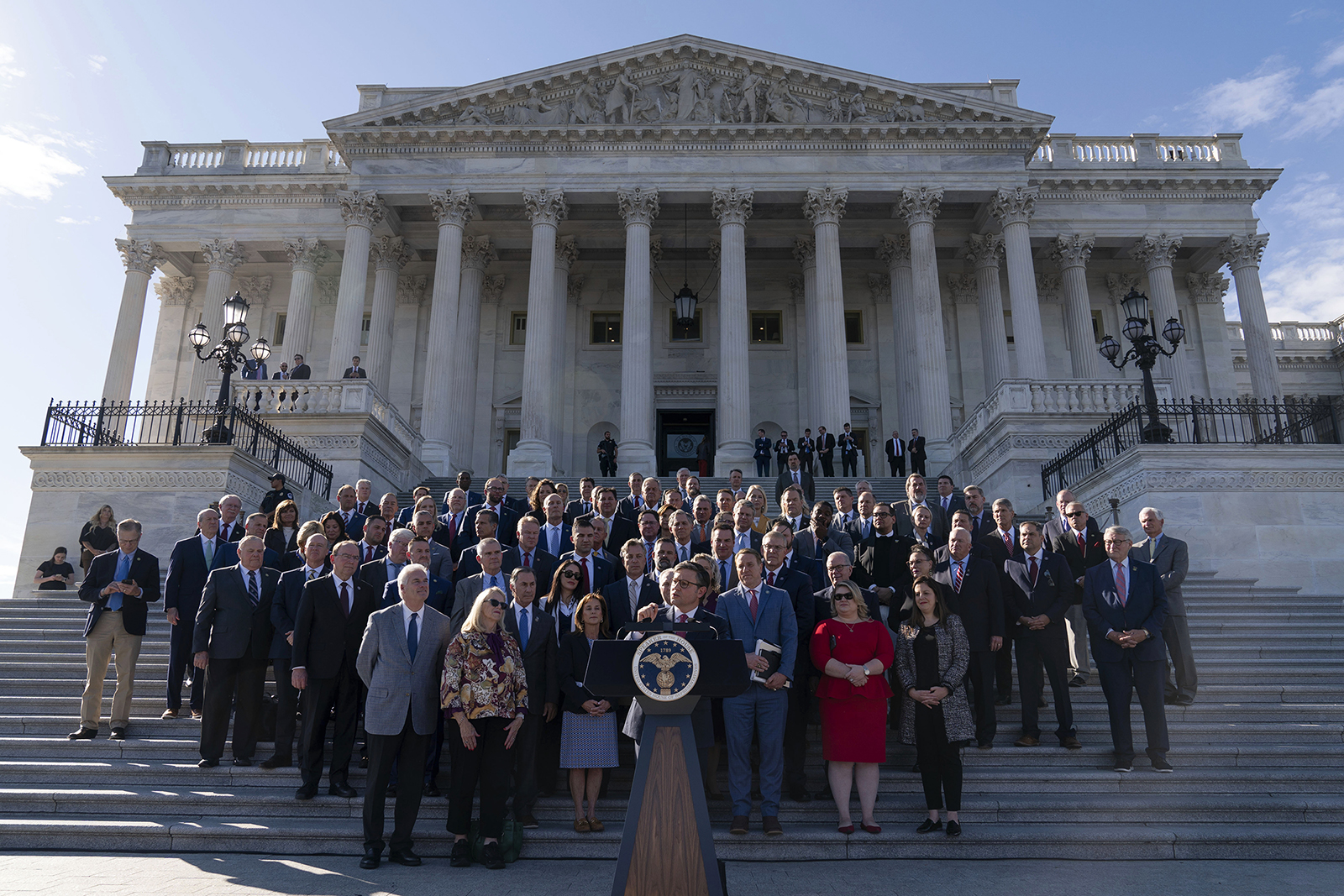(RNS) — Since Rep. Mike Johnson was elected speaker of the House of Representatives, much has been written about his evangelical Christian faith and its influence on his right-wing political views. He is, as Robert P. Jones wrote this week, “the embodiment of white Christian Nationalism in a tailored suit.”
Less attention has been paid to an idea at the very center of his career and political theology: his contention that American Christians are being persecuted.
On his podcast, “Truth be Told with Mike and Kelly Johnson,” hosted with his wife, the Louisiana congressman once lamented, “What we found was often the Christian viewpoint is not given equal treatment and equal platform and equal chance … Very often religious viewpoints, specifically Christian viewpoints, are censored and silenced.”
As a lawyer with Alliance Defending Freedom, a Christian legal group, Johnson has worked to protect Christians from such attacks in the name of religious liberty. When asked on the above podcast episode why he only focused on Christians’ religious liberty, he explained, according to The New York Times, “I would say because the fact is very simple: There is not an open effort to silence and censor the viewpoints of other religions. It is only and always the Christian viewpoint that is getting censored.”
For more than a century, white evangelicals in the United States have cultivated a myth that Christians are under siege by a hostile secular culture. This “persecution complex” has been stoked for decades by white evangelical leaders, conspiracy theorists, right-wing media stars and, most recently, Donald Trump, who tells his white evangelical flock that without his protection the secular left will destroy them.
The “war on Christians” has been advanced, in these accounts, by Supreme Court decisions outlawing mandatory prayer and Bible-reading in public schools in the 1960s and legalizing abortion and marriage for same-sex couples. Concerns have also mounted with the growing visibility of non-Christian religious minorities in the US, especially Islam, and the rising ranks of the nonreligious have produced minor skirmishes over coffee cups that say “Happy Holidays” rather than “Merry Christmas.”
In 2020, two-thirds of white evangelicals told PRRI that “Christians face a lot of discrimination in the United States today,” more even than Muslims, Black people and Hispanic people. This perception is not new: In a 1998 study of American evangelicalism, the sociologist Christian Smith reported, “Time and again we heard evangelicals observe that every racial, ethnic, religious, political, and ideological perspective existing is given fair time and a fair hearing, except the Christian perspective.”
This perception of persecution runs deep in evangelical subculture, abetted by theology based on biblical passages like the Gospel of John’s chapter 15, in which Jesus told his disciples: “If the world hates you, know that it has hated me before it hated you. If you were of the world, the world would love you as its own; but because you are not of the world, but I chose you out of the world, therefore the world hates you.”
The thing is, the world doesn’t actually hate Christians. Especially in the United States, where white Christians until very recently constituted a demographic majority, American society, culture and law have always privileged white Christian values, norms and practices.
The very body that Speaker Mike Johnson now controls has never been led by a non-Christian, and the 118th Congress as a whole is 88% Christian and 57% Protestant, well above each group’s share in the population. As American society has grown more racially and religiously diverse, white Christian supremacy has increasingly been questioned, but challenges to Christian supremacy are not the same as challenges to their religious freedom.

House Speaker Mike Johnson of La., flanked by the Republican conference, speaks during a news conference outside the Capitol in Washington, Wednesday, Oct. 25, 2023. (AP Photo/Jose Luis Magana)
The perception of persecution nonetheless serves a purpose within the evangelical world. In the 1998 study by Christian Smith mentioned above, the author argued that American evangelicalism remained strong, even as mainline Christian communities were shrinking, not in spite of but because evangelicals imagined themselves “embattled with forces that seem to oppose or threaten it.”
Without this sense of embattlement, “evangelicalism would lose its identity and purpose and grow languid and aimless,” Smith added.
This “embattled and thriving” thesis has shaped scholars’ understanding of evangelical culture for decades. But it is coming under strain, as it is no longer clear that this community is thriving, at least religiously. By many measures the white evangelical community has actually been shrinking. The community is deeply divided over a number of issues, not least their alliance with Trump, which tarnished an already troubled brand.
If white evangelicals today perceive themselves as more embattled than ever, shouldn’t this be making them stronger?
My research suggests embattlement can encourage subcultural strength, but only up to a point. Once this tipping point is crossed, heightened perceptions of embattlement can set into motion processes that lead to subcultural decline. As the saying goes, you can have too much of a good thing.
How did this happen? First, in the case of white evangelicals, feelings of persecution have often been stoked by faith leaders to maintain strong levels of commitment and unity, encouraging extremely high church attendance and strong religious identity. But as the “war on Christians” narrative was weaponized by political and media elites, the focus of evangelical commitment shifted from a shared religious project to a shared political agenda, one that has come to revolve around Trump himself.
In recent years, those who have dissented from Trump’s political agenda have either exited or were forced out of white evangelical communities, leaving them smaller and more uniformly aligned with the political right. Meanwhile, relatively nonreligious political conservatives began identifying as evangelical. The term today signals loyalty to a political as much as a religious project.
Second, the rise of social media and a right-wing news ecosystem has deepened the evangelical echo-chamber, inviting outright disinformation and conspiracy theories such as QAnon. Politically driven evangelicals are also increasingly exposed to white supremacist and anti-government political ideas and tactics within these spaces.
The fruits of this radicalization were on full display on Jan. 6 and its aftermath, when evangelical Christians participated in the insurrection alongside white supremacists and antigovernment extremists; and evangelical Christians — including Speaker Mike Johnson — led efforts to overturn the results of the 2020 election.
White evangelicals are no longer embattled and thriving. They have crossed over the embattlement tipping point and have begun a process of subcultural decline that has left them smaller, more politically radical and more desperate to hold onto their power at any cost.
If it is true, then, that some optimal level of embattlement can strengthen the evangelical community, then the onus is on internal leaders to carefully calibrate their embattlement rhetoric in light of its effects on their community’s religious strength. But in recent years, this task has been entrusted to elite “conflict entrepreneurs” within politics and media, like Johnson, whose primary goal is securing white evangelical votes and viewership. Many evangelicals appear to have accepted this bargain in exchange for the protection that these elites offer from their so-called enemies. But today’s agents of embattlement have no incentive to calibrate their rhetoric, and it is little wonder they have pushed evangelicals past their tipping point. It’s time to reconsider who is really waging the “war on Christians.”





